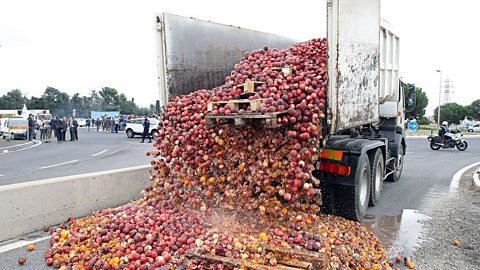On 22 June the UK marks Windrush Day, celebrating the arrival of the Empire Windrush in Britain.
In 1948, hundreds of people from the Caribbean boarded the ship and travelled to Tilbury Docks in Essex. With them they brought an explosion of dance, art, writing and music which would transform British culture.
We spoke to British Trinidad-born poet, novelist, musician and academic Anthony Joseph, about how the arrival of the Windrush changed the UK.
Who are the Windrush Generation?
The Windrush Generation includes anyone who immigrated to Britain from the Caribbean between 1948-1973.
After WWII, large parts of Britain were in desperate need of rebuilding, so the UK actively invited immigration from Commonwealth nations. There was no shortage of jobs in industries such as National Rail and the NHS, and public transport recruited almost exclusively from Jamaica and Barbados. But, despite the invitation, Caribbean people were often met with intolerance from large parts of the white population. The first Windrush arrivals were often denied accommodation and access to some shops, pubs, clubs and even churches.
Anthony reminds us that Windrush was not the beginning of multicultural Britain. "We’ve been coming here since the 1800s,” he says. “The Windrush arrived at a particular time in UK history when British culture was open. There was a space there after WWII, and I think a lot of British people were still trying to figure out what it meant to be British."
"So, politically, the impact of the Windrush Generation’s arrival expanded the definition of what Britain was.”
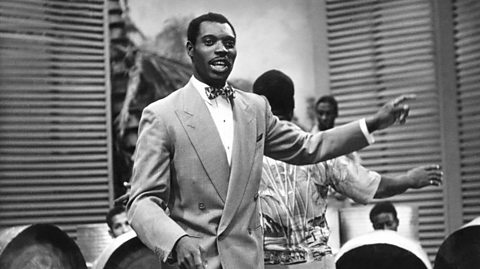
A melting-pot of music
Caribbean communities were already very diverse - with musical influences from Latin America, Africa and Asia. “All of that coming into the UK had a big impact musically,” says Anthony. “You had a lot of musicians coming who could play jazz, blues, gospel music, Latin music coming into a London scene that at that time was primarily swing-based and dance bands."
"So not just African and Caribbean music, but the tins of Spanish music and Spanish and Cuban rhythms, all of that just really enriched the musical palette of London.”
Ska - a precursor to Reggae, characterised by a walking baseline and syncopated rhythms - was adopted into small clubs in Soho and Brixton where Caribbean people would perform. “The growth and the progression had been gradual. The people that came in 1948 came to scenes that were already happening and they slipped in and expanded it - they were already there.”
Many of the styles you listen to today have roots in Caribbean London. The fusion of Jamaican reggae into British music developed genres such as drum and bass and dubstep.
Soca (Soul of Calypso) was coined by artist Lord Shawty in an effort to revive traditional Trinidadian and Tobagan calypso music in the 70's. By the 1980s, soca had evolved into a range of styles and was popular in Britain to sample calypso and other Caribbean beats and rhythms into tracks. This style of sampling continued to inspire London pop artists in the years to come, and lay the foundations for many electronic styles such as dancehall, UK garage, jungle, ragga and hip hop.
In the early 2000s, London grime artists such as Dizzee Rascal, Stormzy and Lethal Bizzle encompassed many of these styles and revolutionised the British rap scene.

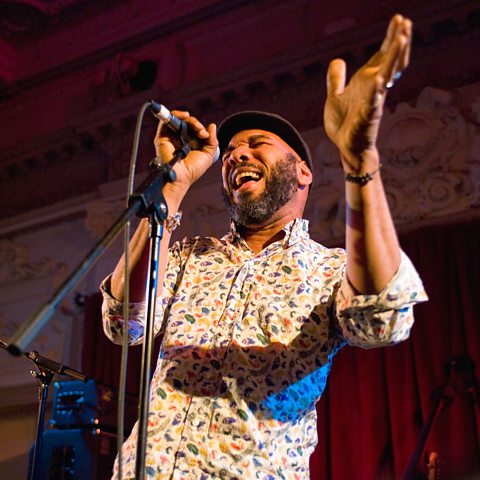 Image source, GETTY IMAGES
Image source, GETTY IMAGESThe language of erasure
Caribbean writers “always find a way of dismantling and questioning the English language with Creole influence”, Anthony says. “I consider myself a Caribbean writer. The language that I like to use in my work comes out of an experience of Caribbean language and how we use Creole."
"That aesthetic is important to me - the way I turn English upside down and find new ways around it. There’s a musicality and rhythm to Caribbean speech which has carried through to English.”
But the work of Caribbean people and their contributions to British arts are often under-celebrated. "People are not aware of performers and musicians and actors that were here in the 60’s. They’re just not aware.”
For example, Anthony’s second novel Kitch: A Fictional Biography of a Calypso Icon fills in the history of Lord Kitchener, who is described as ‘the grand master of Calypso’. “You have a man coming from Trinidad in ’48 and singing ‘London is the Place For Me’ on board the Windrush, and it’s probably one the most iconic images of the arrival - and when I said I was doing a book about Lord Kitchener people asked me why I was writing about this old English general,” he laughs. “They had no idea who he was. But I think it’s changed now, people know - but not at the time. The history is erased.”
The 2018 Windrush Scandal
Following the British Nationality Act 1948, everyone who was a British subject (having been born in the UK or a British colony) was granted the right to settle in the UK. This meant that the Windrush Generation did not need any documents to prove their legal immigration status, and were not given any following changes in immigration laws in the early 1970s. Despite this, cases of wrongful detainment, deportation and denial of benefits to British people - a majority from the Windrush Generation - started surfacing in 2018.
Anthony had arranged Windrush: A Celebration - a showcase of pan-Caribbean and British performance featuring artists such as Calypso Rose and GAIKA - to mark the 70th anniversary of Windrush arrival in November of last year as the scandal was unfolding.
“The Windrush show was put together to celebrate how far we’ve come, where we’ve come from and what we’ve contributed - and suddenly you had this situation where people were questioning who they were again, or where they belonged." he says.
"It was a celebration, but at the same time we couldn’t ignore the elephant in the room. The reality of 70 years of Windrush in this country is one of trauma, difficulty and racism and revolutionary behaviour - so that has to be part of it.”
But most would argue the seismic impact of the Windrush Generation, particularly on London, has sculpted post-imperial British culture.
“We’re talking about how the Caribbean influence on Britain - but what’s really important is to see how Britain has become more Caribbean," Anthony wraps up. “It’s all British culture. Britain has always been a place of migration and a movement of people and mixing - which is one of the beautiful things about the UK.”
What is Caribbean music? - GCSE Music
Brush up on the Calypso music of Trinidad and Tobago.
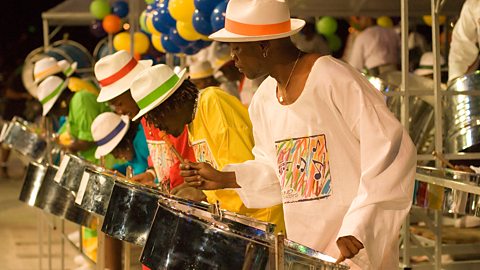
The fabulous history of drag
From the Shakespearean stage to serving up runway realness.
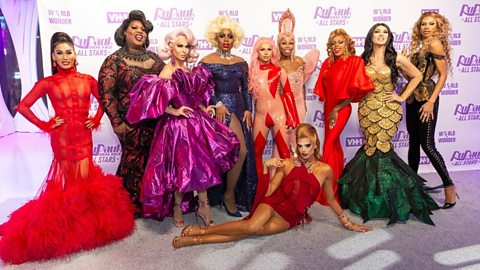
Five unusual protests in history
For years people have found interesting and creative ways of getting their voices heard.
